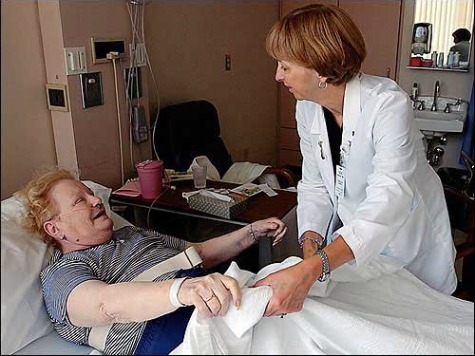According to KQED, the PBS station in San Francisco, the “death with dignity” folks are going to be making another big lobbying push in California.
The spearhead is a Denver-based advocacy group called Compassion & Choices. “The time is now,” Barbara Coombs Lee, the group’s president, told KQED. “We all together have made a commitment to see aid in dying accessible, transparent, available to Californians within five years.”
The idea of death with dignity (DWD) is that doctors should be able to prescribe lethal doses to struggling patients who want to end it all. DWD has been a major issue in Europe for years. Indeed, despite some startling headlines–sample from the Telegraph in the UK: “Sentenced to death on the NHS. Patients with terminal illnesses are being made to die prematurely under an NHS scheme to help end their lives, leading doctors have warned”–DWD has gained momentum in Europe: Belgium has just approved euthanasia for children.
Of course, over the eons, patients, doctors, and families have quietly made life-and-death decisions in the face of severe illness and suffering. Yet the issue has gained salience over the last half-century for two reasons: First, technology has made it possible to keep people alive, even in a vegetative state, for years, even decades. And second, the government is increasingly involved in healthcare spending.
And that state involvement has been a double-edged sword: On the one hand, the state provides financing for care, but on the other hand, the state doesn’t want to finance too much care.
Indeed, once healthcare is brought inside the bureaucratic domain, decisions about “pulling the plug” are inevitably bureaucratized; they become the stuff of policy, controversy, and publicity. In other words, hard choices that were once made, for better or worse, in ethical shadowlands are now managed–in triplicate–by politicians, watched over by activists of all persuasions.
Speaking of activists, Coombs Lee says that most desperately ill patients don’t necessarily want to end their lives–they simply want the option. The KQED article quotes one 50-year-old lung-cancer patient saying, “There’s nothing that can prepare you for when your doctor looks you in the eye and tells you, ‘You have cancer.’ But having choice helps me feel I have some control over a situation that is uncontrollable.” It’s hard to argue with such a sentiment, of course, and that’s why DWD gains ground.
Yes, it would be nice if activists were working so zealously on behalf of, say, a cure for cancer, but in the meantime, amidst advancing technology and rising costs, the DWD forces have the wind at their back.
Many American jurisdictions already have DWD policies in place, and now that Uncle Sam, thanks to Obamacare, is in charge of so much more of our healthcare, it’s a certainty that DWD will spread.
Indeed, it’s a dead certainty.

COMMENTS
Please let us know if you're having issues with commenting.